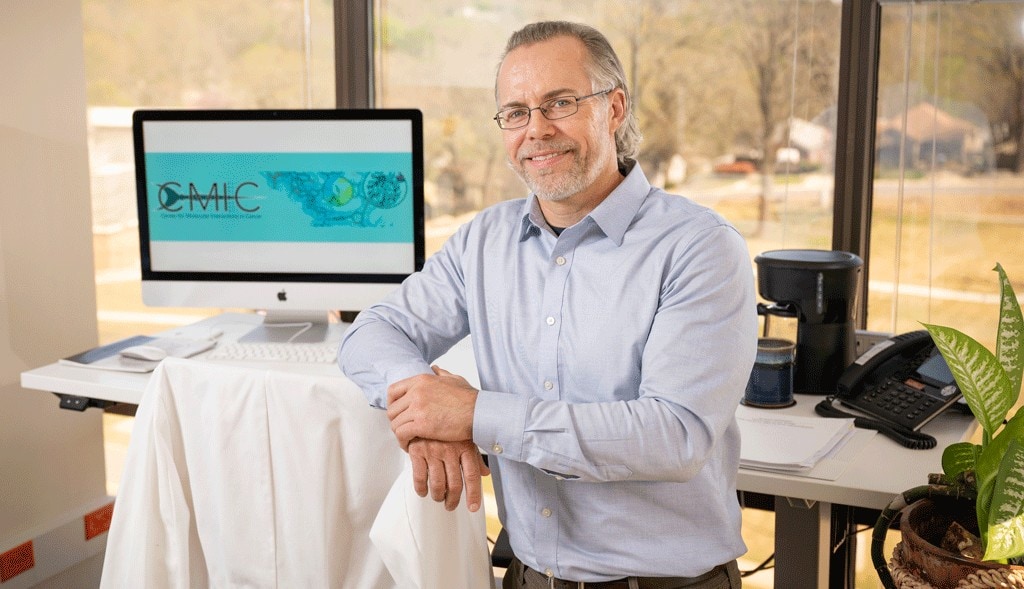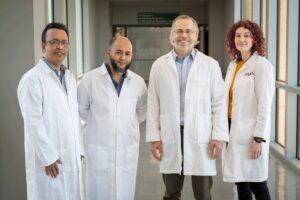View Larger Image

THE MAN BEHIND THE MOLECULES: Robert Eoff, Ph.D., is the driving force behind the creation of the UAMS Center for Molecular Interactions in Cancer.
Image by Evan Lewis
UAMS Awarded $11.48 Million Federal Grant to Establish Center for Molecular Interactions in Cancer
| The University of Arkansas for Medical Sciences (UAMS) Winthrop P. Rockefeller Cancer Institute received a five-year, $11.48 million federal grant to create the Center for Molecular Interactions in Cancer (CMIC).
The grant was awarded by the National Institute of General Medical Sciences (NIGMS) Centers of Biomedical Research Excellence (COBRE) program. COBRE grants are awarded to establish centers of research excellence around a specific scientific theme that will ultimately become self-sustaining.
The UAMS Center for Molecular Interactions in Cancer and its researchers will study the molecular features and properties of biomolecules that drive cancer using structural biology and high-resolution imaging with precise, quantitative analysis.
“The center will create a critical mass of researchers who are able to gain deep molecular-level insights into the mechanisms that govern the initiation, progression and treatment of cancer,” said Robert Eoff, Ph.D., professor in the Department of Biochemistry and Molecular Biology in the UAMS College of Medicine. Eoff is the principal investigator and will lead the center.
“Essentially, we’re digging down to the level beneath the body’s organs to study the components of the cell — the molecules and even the atoms within them — to understand what makes a cancer cell cancerous.”
The grant will strengthen the UAMS cancer research infrastructure with the creation of two research cores, each with highly specialized equipment for cancer research. They are:
- Structural Biology Core led by Eric J. Enemark, Ph.D., associate professor in the UAMS Department of Biochemistry and Molecular Biology. This area will assist CMIC research project leaders with high quality sample preparation, world class instrumentation and computational resources required for 3D high resolution structural studies.
- Biomolecular Interactions Core led by Kevin Raney, Ph.D., professor and chair of the UAMS Department of Biochemistry and Molecular Biology. This core will provide quantitative analysis of macromolecular interactions and dynamics down to the level of single molecules.

The Center for Molecular Interactions in Cancer will bring talented UAMS researchers together, like (l to r) Alinoor Rahman, Ph.D., Sayem Miah, Ph.D., Eoff and Katie Ryan, Ph.D., to generate new ideas in cancer research.Evan Lewis
“Over the last several years, the UAMS Winthrop P. Rockefeller Cancer Institute has made a concerted effort to hire the best and brightest laboratory scientists,” said Michael Birrer, M.D., Ph.D., director of the Cancer Institute and UAMS vice chancellor. “This is a culmination of that effort in that we have created a successful critical mass of talented scientists focused entirely on oncology. This will greatly benefit the people of Arkansas.”
The center will offer researchers access to highly advanced technologies like cryogenic electron microscopy (cryo-EM), which uses high speed electrons to view high resolution images from frozen samples.
“In the past, we were limited in the types of molecules we could investigate, but recent advances, especially in cryo-EM, now allow us to study a wider array of molecules,” said Eoff. “Another barrier was related to the incredibly challenging and labor-intensive nature of these types of studies. To improve the speed and capacity of our workflow, artificial intelligence and robotics will also be incorporated into the center’s processes.
“One of the goals of this center is to take advantage of the advances in structural biology and biophysics to understand the 3D shape of molecules — how they change and impact cancer progression and resistance to therapies.”
Eoff will lead the CMIC Administrative Core which will offer a pilot program for early phase researchers to help them gather preliminary data and compete for R01 federal grant support. The center will also have a formal faculty development program where seasoned UAMS researchers mentor junior investigators.
“It is exciting to bring these researchers together so they can find community and generate new ideas with other talented people doing cutting-edge science,” said Eoff.
The research grant of $11,475,000 reported is funded by NIH National Institute of General Medical Sciences (NIGMS), award number 1P20GM152281-01.